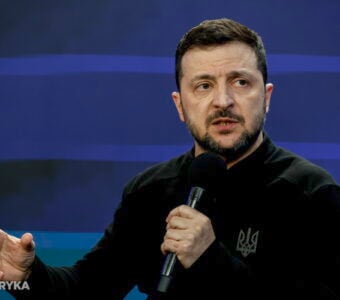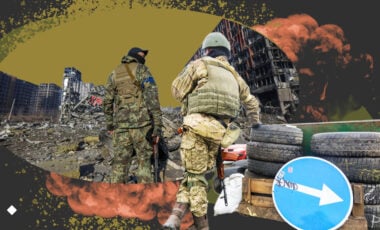russia produces insufficient number of Kalibr missiles for strikes – UA intel chief

Photo: ARMYINFORM
The russian federation has from 13% to 27% of the operational-tactical sea, air, and land-based missiles of its production. Currently, the russian industry is trying to produce 20 Kalibr missiles per month.
The head of Defense Intelligence of Ukraine's Ministry of Defense, Kyrylo Budanov, stated this in an interview with the BBC.
"In terms of the main types, they have between 13 and 27% sea-based, air-based, and ground-based operational-tactical missiles. All the main types have fallen below 30%, which is an untouched reserve. On average, in one missile launch, they used from 70 to 75 missiles for a terrorist act against our infrastructure. Their industry is trying to produce 20 Kalibr missiles a month. The missile launch uses mostly Kh-101, Kh-505, and Kalibr missiles. Do the math yourself. How much the entire industry has to work to provide one single launch? The situation with Kh-101 missiles is approximately similar, even worse, than with the production of Kalibr. With the Iskander missiles, they are a total disaster," Budanov noted.
According to him, the insufficient number of missiles forced the russians to turn to Iran for help and buy Shahed drones, which they received in batches.
Regarding the intentions to purchase ballistic missiles from Iran, Budanov noted that the russian federation has such a desire, but at the moment, russia has not received any rockets.
"They have such intentions. However, as of now, Iran has not transferred a single missile to the russian federation. Because Iran also understands where this whole situation is going. They understand the consequences for their country in case of a transfer. They are trying in every way to postpone this process. They don't refuse outright, but they keep postponing it. Now, in the next two weeks, the russians will try to persuade them to hand over the missiles again. We'll see how it ends. Everyone is working to prevent this from happening," Budanov emphasized.
Answering the question of whether russia will continue attacks on the critical infrastructure of Ukraine, the head of intelligence noted that the Russians will, in any case, try to carry them out in the future because terrorism is in the style of the russian federation. At the same time, he emphasized that there are quite a few missiles left, and russia's defense industry cannot produce a sufficient number to ensure the continuous delivery of a large number of missile strikes.
Reference
Analysts of the Institute for the Study of War (ISW) report that russia is unable to defend its territory despite the statement that it will apparently "never run out of Kalibr missiles."
On December 29, russia launched another missile attack on Ukraine, launching 69 missiles, of which, according to the Ukrainian authorities, they shot down 54.
The Ministry of Defense of russia, in response to reports from the West that the russian federation has actually exhausted its reserves of high-precision weapons systems, stated that the russians "will never run out of Kalibr missiles."
ISW analysts believe that russia has primarily exhausted its stockpile of high-precision weapons systems, which will not prevent it from continuing to threaten Ukraine's critical infrastructure and inflict considerable suffering on the civilian population in the short term.
According to detailed information, during yesterday's massive missile attack by the russian occupying forces, Ukrainian air defense destroyed 58 out of 70 cruise missiles. In addition, three reconnaissance UAVs and a Mi-8 helicopter were destroyed by the air defense of the Air Force in the eastern direction.


















































